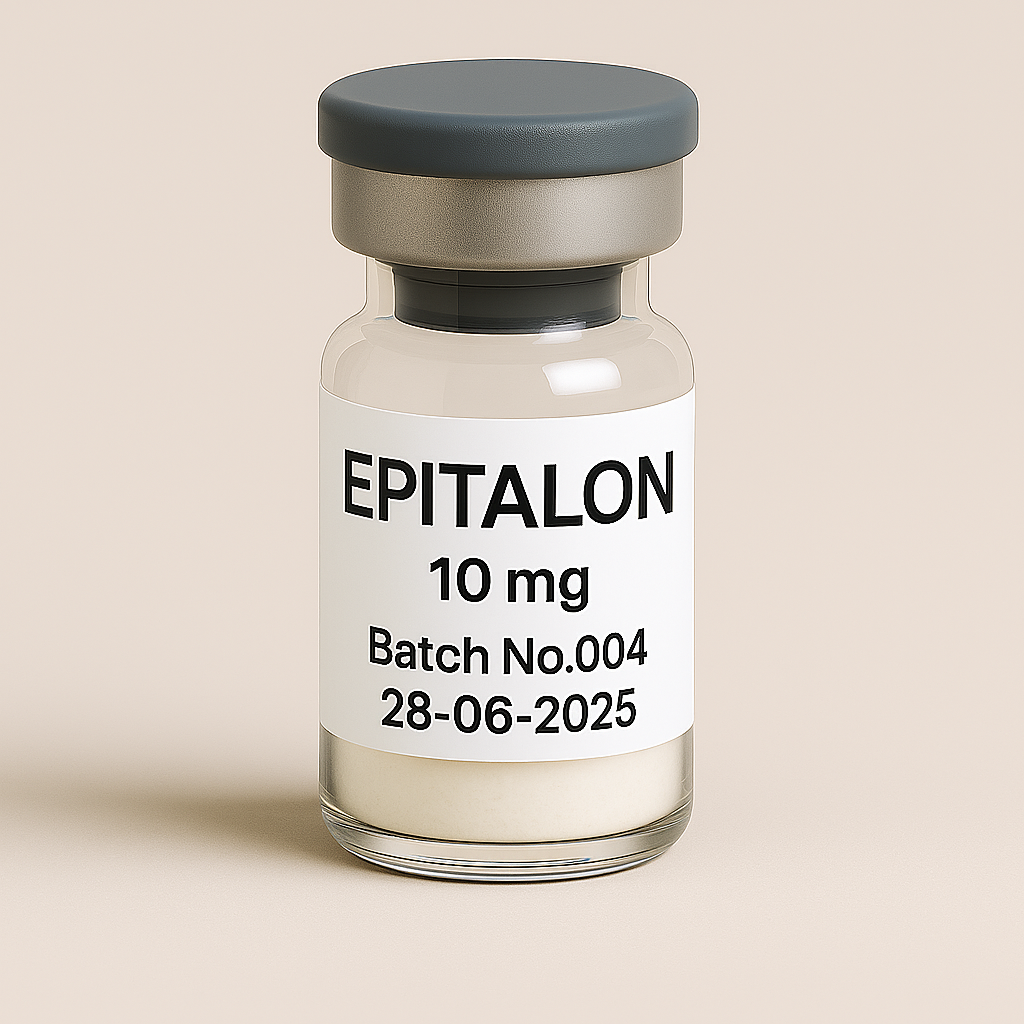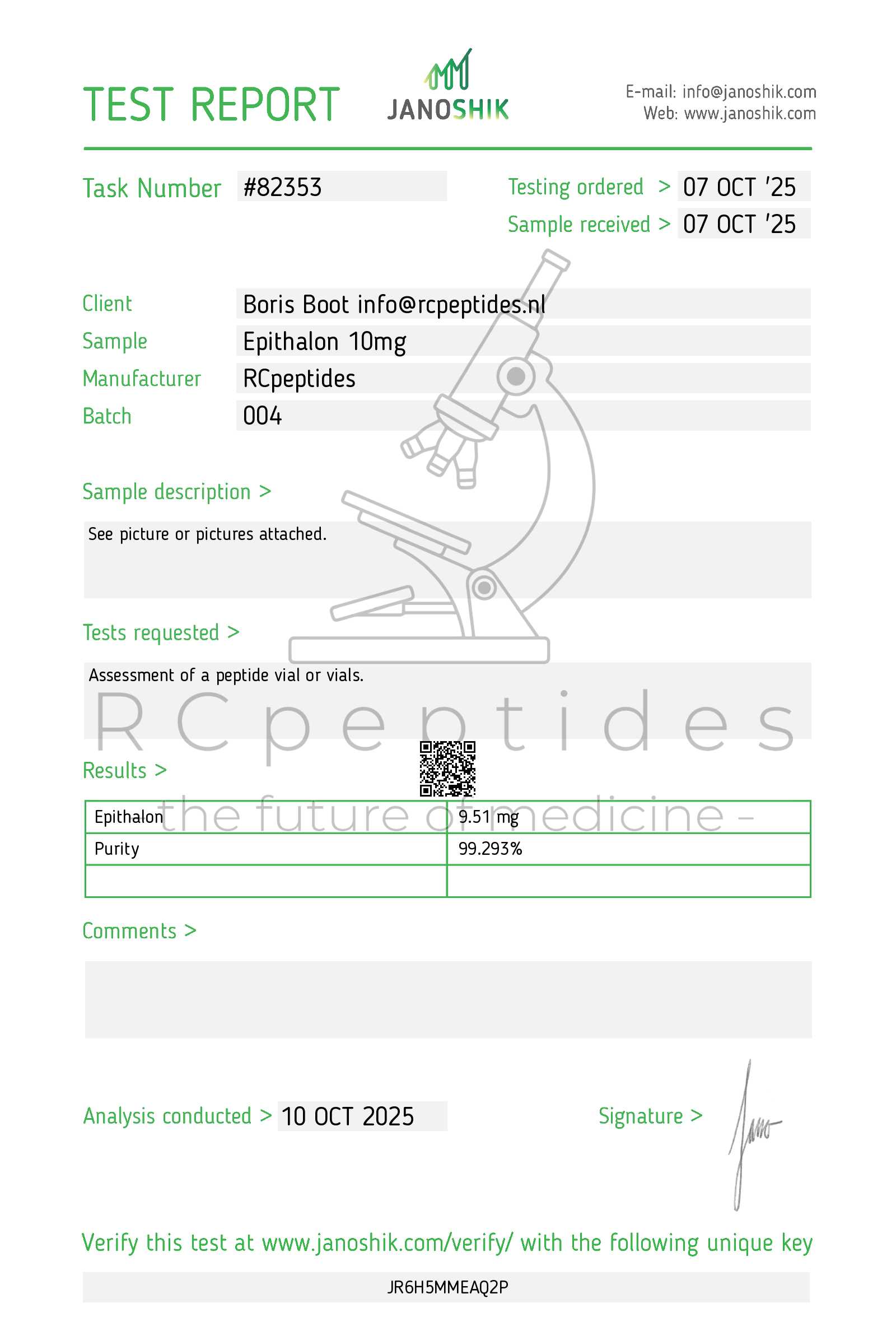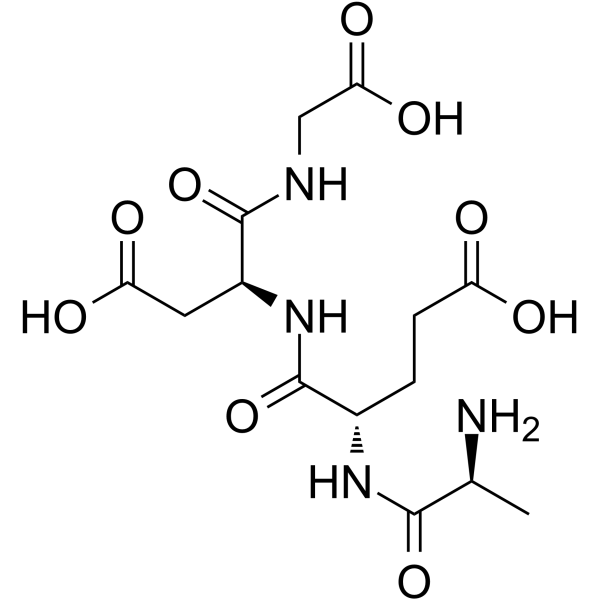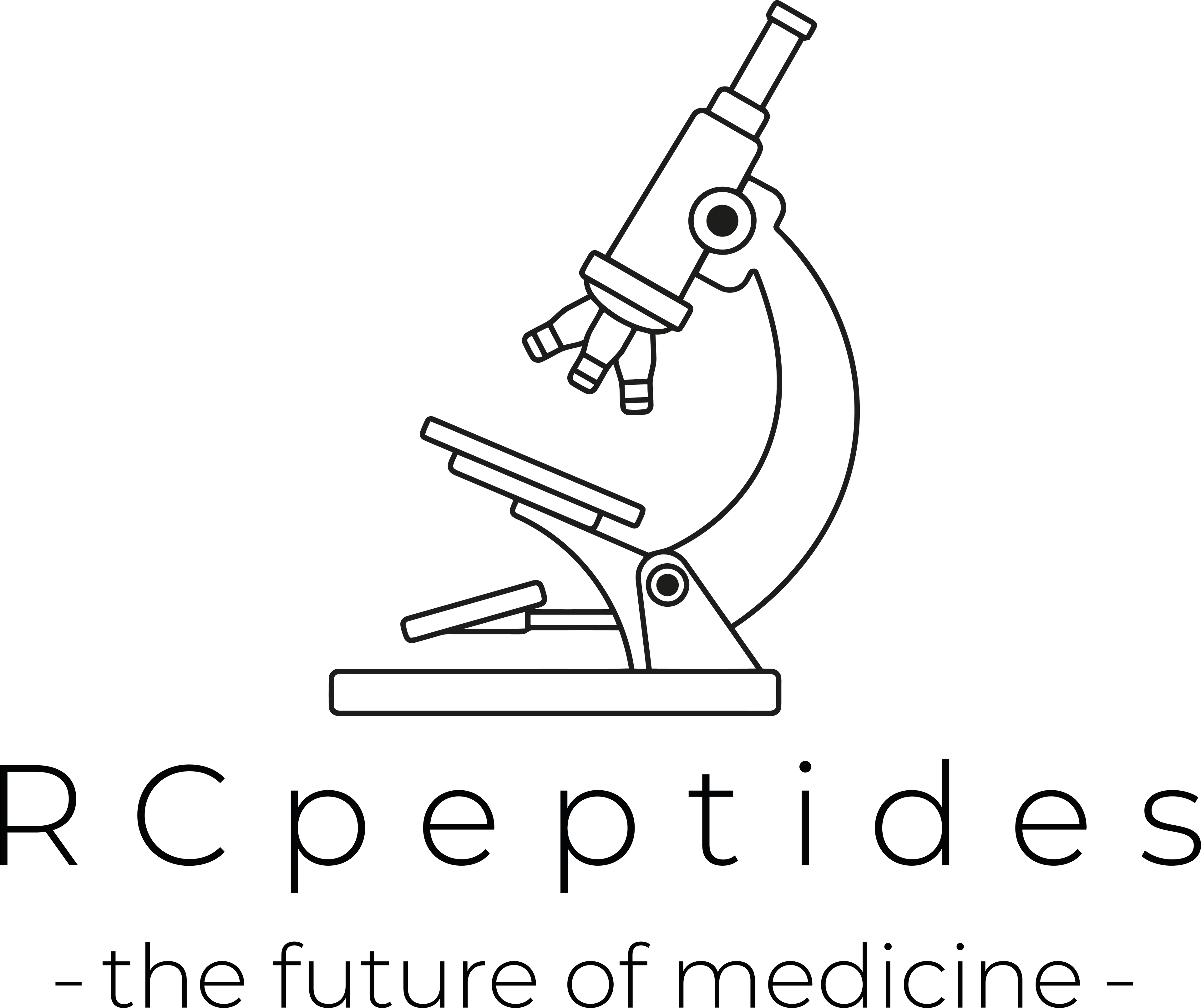
Epitalon 10mg vial
Pickup currently not available
NOT FOR HUMAN CONSUMPTION
Epitalon (Ala–Glu–Asp–Gly; AGAG) is a short tetrapeptide derived from the bovine-pineal extract “epithalamin,” developed by the St. Petersburg/Khavinson group. It’s marketed as a “geroprotective” peptide with proposed actions on telomerase activation, chromatin remodeling, circadian signaling, and stress-response pathways. It is not FDA/EMA-approved; human evidence consists mostly of small, regionally published trials and observational series.
Additional Benefits of Epitalon Now Under Investigation
| Benefit | Key take-aways |
|---|---|
| 1 Telomerase / telomere dynamics | In cell/animal studies, Epitalon up-regulates TERT and slows telomere attrition; limited human data report telomere length stabilization over months—methodology and durability remain debated. |
| 2 Circadian & melatonin signaling | Reported night-time melatonin increases, improved sleep quality, and seasonal rhythm normalization in older adults, consistent with pineal-axis modulation. |
| 3 Immune function in aging | Observational programs note higher T-cell counts and reduced respiratory infectionincidence in elderly cohorts receiving cyclic courses; controlled, blinded evidence is sparse. |
| 4 Antioxidant / stress-response | In models, peptide reduces lipid peroxidation, normalizes SOD/GPx, and modulates NF-κB/Nrf2 signalling; human biomarker data are small and heterogeneous. |
| 5 Metabolic markers | Signals for modest glycaemic and lipid improvements (↓ fasting glucose, TG) in some aging cohorts; confounded by concurrent lifestyle changes. |
| 6 Ocular/retinal support | Small studies suggest improved retinal electrophysiology and function in age-related ocular changes; needs replication with modern endpoints. |
| 7 Reproductive/endocrine aging | Limited data hint at gonadotropic and thyroid tone normalization in elderly; clinical relevance uncertain. |
| 8 Onco-gerontology signal (prophylactic) | Long follow-ups from Russian registries propose lower cancer incidence/mortality with multi-year peptide programs; absence of randomized, blinded designs limits inference. |
| 9 Physical function & QoL | Reports of improved exercise tolerance, sleep, and self-rated health in older adults on cyclic therapy; placebo-controlled confirmation is lacking. |
2. Molecular Mechanism of Action
2.1 Proposed pharmacodynamics
-
Telomerase/epigenetic: Enhances TERT expression and may influence heterochromatin maintenance at telomeric/subtelomeric regions.
-
Pineal/circadian: Modulates melatonin synthesis and clock-gene output (e.g., BMAL1/Per axes), supporting sleep–wake regulation.
-
Stress/inflammation: Down-shifts NF-κB, supports Nrf2 antioxidant responses, improves mitochondrial redoxmetrics in models.
2.2 Down-stream biology
| Pathway | Functional outcome | Context |
|---|---|---|
| TERT/telomere maintenance | ↓ Replicative senescence markers | In vitro, animal |
| Clock genes / melatonin | Sleep consolidation, circadian alignment | Older adults (signals) |
| Nrf2–ARE / antioxidant enzymes | ↓ ROS, lipid peroxidation | Liver, heart, brain (models) |
| NF-κB restraint | ↓ Pro-inflammatory cytokines | Immunosenescence |
| Mitochondrial function | ↑ Membrane potential, ↓ mtROS | Neurons/myocytes (models) |
3. Pharmacokinetics
-
Route: Reported SC/IM injections (common in publications), intranasal, and occasional oral/sublingual use; no standardized formulation.
-
Absorption/half-life: Very short plasma t½ for the tetrapeptide (minutes–hours); hypothesized epigenetic/circadian effects may outlast exposure.
-
Distribution/clearance: Rapid tissue uptake and renal peptidase clearance expected; human PK is not well characterized.
4. Pre-clinical and Translational Evidence
4.1 Cellular/animal
-
In vitro: TERT up-regulation, telomere preservation, improved chromosomal stability, reduced β-gal senescence staining.
-
In vivo (rodents): Improved survival curves in some strains, antioxidant enzyme normalization, tumor latencyshifts in specific models, and circadian improvements.
4.2 Human studies
-
Small, mostly open-label or regionally randomized trials report improved melatonin profiles, sleep, immune markers, and some metabolic indices; multi-year observational data suggest mortality reduction when combined with other “cytomedins,” but methodology limits causal claims.
Evidence quality note: Most human data are low–moderate quality, with limited blinded, placebo-controlled trials and variable assay rigor for telomeres and hormones.
5. Emerging Clinical Interests
| Field | Rationale | Status |
|---|---|---|
| Insomnia/circadian disruption in aging | Pineal–clock modulation | Pilot trials |
| Immunosenescence/influenza risk | T-cell support, inflammatory tone | Observational |
| Metabolic syndrome in elderly | Redox + circadian effects | Exploratory |
| Neurodegeneration (supportive) | Mitochondrial redox & sleep consolidation | Preclinical → pilot |
| Onco-prevention (hypothesis) | Telomere/homeostasis | Observational only |
6. Safety and Tolerability
-
Common: Injection-site discomfort, transient fatigue or alertness changes (timing-dependent), headache, mild GI upset with oral forms.
-
Endocrine: Possible melatonin-related daytime sleepiness if dosed late morning; rare vivid dreams.
-
Immunologic: No strong signals of immunosuppression; long-term immune stimulation vs regulation remains uncertain.
-
Oncology: Theoretical concern that telomerase activation might promote neoplastic cell persistence; animal data are mixed. Avoid in active cancer outside studies.
-
Drug interactions: Caution with sedatives (sleep synergy) and agents affecting circadian timing; minimal CYP interplay expected.
-
Special populations: Insufficient data in pregnancy, autoimmune disease, or active malignancy—avoid outside IRB protocols.
Comparative safety matrix
| Concern | Epitalon | Melatonin | Metformin (aging context) |
|---|---|---|---|
| Main action | Telomerase/circadian/anti-inflammatory (proposed) | Pineal hormone; circadian | AMPK/mitochondrial; metabolic |
| Evidence in aging outcomes | Low–moderate (regional) | Moderate for sleep; limited for aging | Mixed for aging; strong metabolic |
| Daytime sedation | Low–moderate (timing-dependent) | Possible | Low |
| Oncologic theory | Telomerase concern | Neutral | Mixed/neutral |
7. Regulatory Landscape
-
Not approved by FDA/EMA for any indication.
-
Available via research-chemical vendors or compounding in some locales; quality varies.
-
Use should remain within research/IRB-guided settings; marketing claims of “anti-aging cure” are not evidence-based.
8. Practical Use & Future Directions
-
If studied (research context): Consider cyclic courses (e.g., 10–20 days per quarter) aligned to sleep schedule(evening dosing) and track sleep metrics, inflammatory markers, and (if relevant) telomere assays with consistent methodology.
-
Lifestyle stack: Prioritize sleep hygiene, daytime light, exercise, protein sufficiency, and metabolic health—these have stronger, proven effects on longevity markers.
-
Trials needed:
-
Multicenter, randomized, double-blind trials with actigraphy, melatonin profiles, immune panels, and clinical endpoints.
-
Standardized PK/PD and bioanalytical validation for telomerase/telomere outcomes.
-
Long-term safety focused on oncology and immune balance.
-
Selected References
-
Aging-related peptide literature from the St. Petersburg Institute (epithalamin/Epitalon): telomerase/telomere, circadian, and immune observations.
-
Redox Biology; Free Radical Biology & Medicine — Antioxidant and NF-κB/Nrf2 signaling under peptide geroprotectors (preclinical).
-
Chronobiology International; Sleep Medicine — Melatonin/circadian endpoints in older adults (context for pineal-axis modulation).
-
Immunity; Frontiers in Immunology — Immunosenescence frameworks relevant to peptide-mediated immune tuning.
-
Oncogene; Cancer Research — Telomerase biology and theoretical oncologic implications of telomerase activation.



